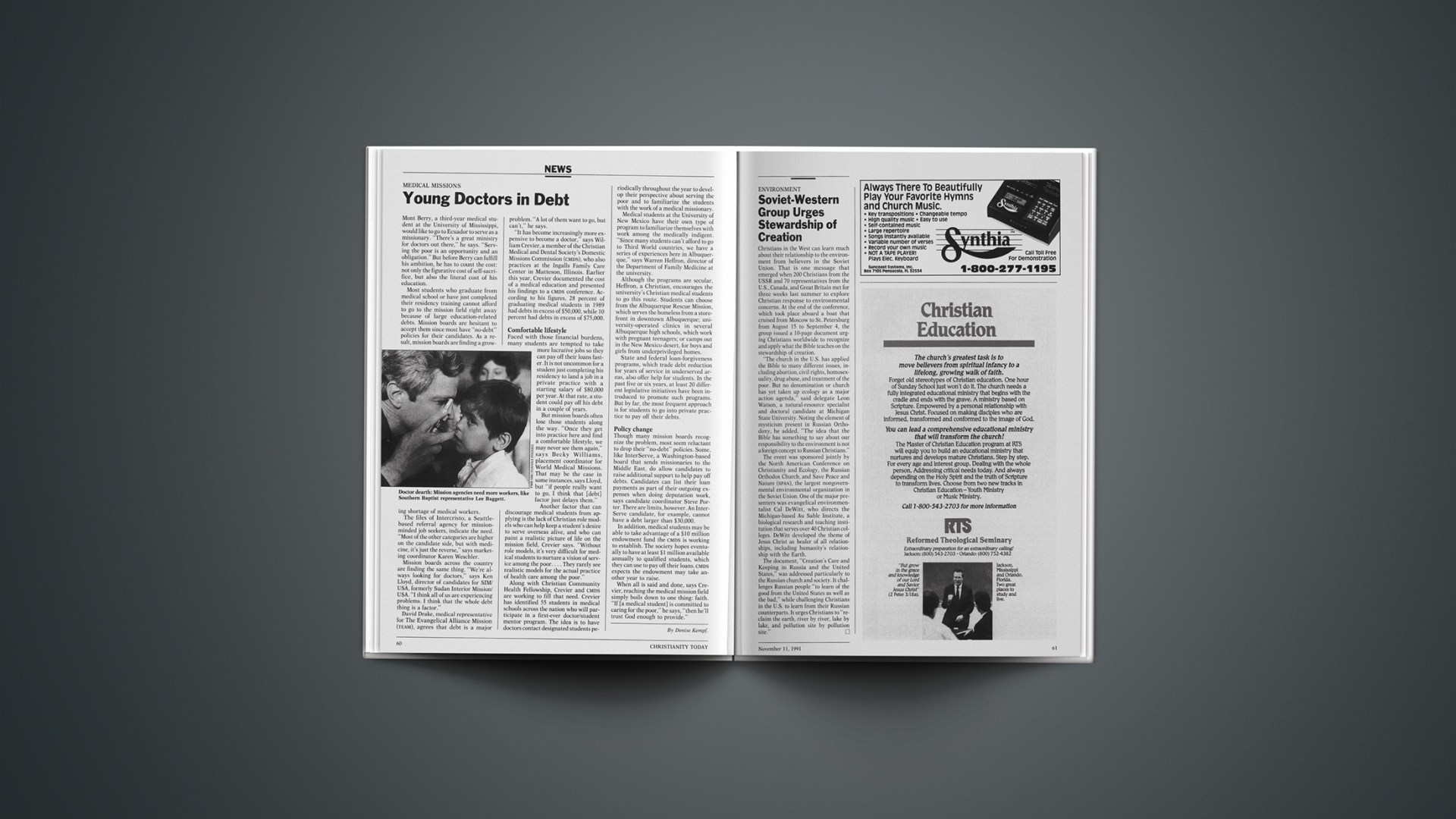Mont Berry, a third-year medical student at the University of Mississippi, would like to go to Ecuador to serve as a missionary. “There’s a great ministry for doctors out there,” he says. “Serving the poor is an opportunity and an obligation.” But before Berry can fulfill his ambition, he has to count the cost: not only the figurative cost of self-sacrifice, but also the literal cost of his education.
Most students who graduate from medical school or have just completed their residency training cannot afford to go to the mission field right away because of large education-related debts. Mission boards are hesitant to accept them since most have “no-debt” policies for their candidates. As a result, mission boards are finding a growing shortage of medical workers.
The files of Intercristo, a Seattle-based referral agency for mission-minded job seekers, indicate the need. “Most of the other categories are higher on the candidate side, but with medicine, it’s just the reverse,” says marketing coordinator Karen Weschler.
Mission boards across the country are finding the same thing. “We’re always looking for doctors,” says Ken Lloyd, director of candidates for SIM/USA, formerly Sudan Interior Mission/USA. “I think all of us are experiencing problems. I think that the whole debt thing is a factor.”
David Drake, medical representative for The Evangelical Alliance Mission (TEAM), agrees that debt is a major problem. “A lot of them want to go, but can’t,” he says.
“It has become increasingly more expensive to become a doctor,” says William Crevier, a member of the Christian Medical and Dental Society’s Domestic Missions Commission (CMDS), who also practices at the Ingalls Family Care Center in Matteson, Illinois. Earlier this year, Crevier documented the cost of a medical education and presented his findings to a CMDS conference. According to his figures, 28 percent of graduating medical students in 1989 had debts in excess of $50,000, while 10 percent had debts in excess of $75,000.
Comfortable Lifestyle
Faced with those financial burdens, many students are tempted to take more lucrative jobs so they can pay off their loans faster. It is not uncommon for a student just completing his residency to land a job in a private practice with a starting salary of $80,000 per year. At that rate, a student could pay off his debt in a couple of years.
But mission boards often lose those students along the way. “Once they get into practice here and find a comfortable lifestyle, we may never see them again,” says Becky Williams, placement coordinator for World Medical Missions. That may be the case in some instances, says Lloyd, but “if people really want to go, I think that [debt] factor just delays them.”
Another factor that can discourage medical students from applying is the lack of Christian role models who can help keep a student’s desire to serve overseas alive, and who can paint a realistic picture of life on the mission field, Crevier says. “Without role models, it’s very difficult for medical students to nurture a vision of service among the poor.… They rarely see realistic models for the actual practice of health care among the poor.”
Along with Christian Community Health Fellowship, Crevier and CMDS are working to fill that need. Crevier has identified 55 students in medical schools across the nation who will participate in a first-ever doctor/student mentor program. The idea is to have doctors contact designated students periodically throughout the year to develop their perspective about serving the poor and to familiarize the students with the work of a medical missionary.
Medical students at the University of New Mexico have their own type of program to familiarize themselves with work among the medically indigent. “Since many students can’t afford to go to Third World countries, we have a series of experiences here in Albuquerque,” says Warren Heffron, director of the Department of Family Medicine at the university.
Although the programs are secular, Heffron, a Christian, encourages the university’s Christian medical students to go this route. Students can choose from the Albuquerque Rescue Mission, which serves the homeless from a storefront in downtown Albuquerque; university-operated clinics in several Albuquerque high schools, which work with pregnant teenagers; or camps out in the New Mexico desert, for boys and girls from underprivileged homes.
State and federal loan-forgiveness programs, which trade debt reduction for years of service in underserved areas, also offer help for students. In the past five or six years, at least 20 different legislative initiatives have been introduced to promote such programs. But by far, the most frequent approach is for students to go into private practice to pay off their debts.
Policy Change
Though many mission boards recognize the problem, most seem reluctant to drop their “no-debt” policies. Some, like InterServe, a Washington-based board that sends missionaries to the Middle East, do allow candidates to raise additional support to help pay off debts. Candidates can list their loan payments as part of their outgoing expenses when doing deputation work, says candidate coordinator Steve Porter. There are limits, however. An InterServe candidate, for example, cannot have a debt larger than $30,000.
In addition, medical students may be able to take advantage of a $10 million endowment fund the CMDS is working to establish. The society hopes eventually to have at least $1 million available annually to qualified students, which they can use to pay off their loans. CMDS expects the endowment may take another year to raise.
When all is said and done, says Crevier, reaching the medical mission field simply boils down to one thing: faith. “If [a medical student] is committed to caring for the poor,” he says, “then he’ll trust God enough to provide.”
By Denise Kempf.










